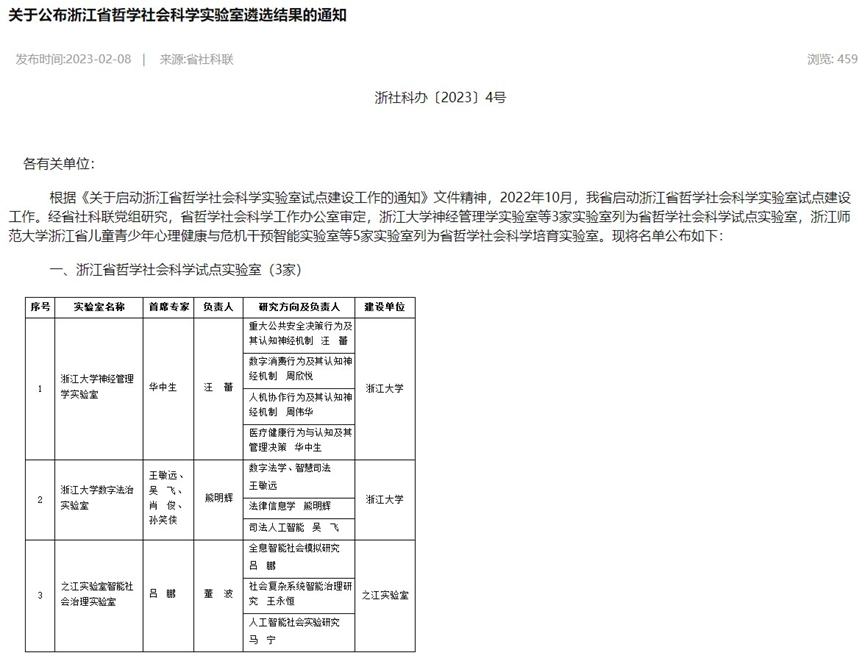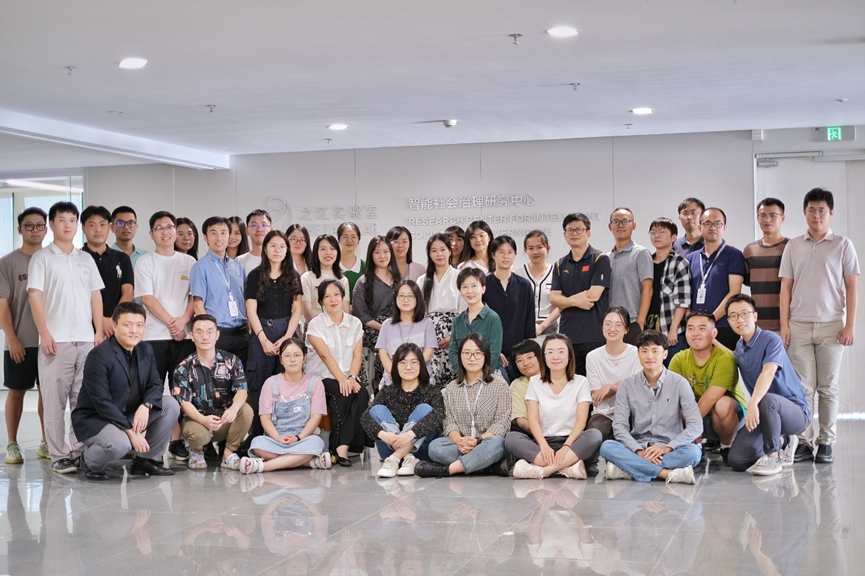


Recently, the selection results of Zhejiang provincial philosophy and social science laboratories were officially released. ZJ Lab's Intelligent Society and Governance Laboratory was one of the first three Zhejiang Provincial philosophy and social science pilot laboratories.
Why would ZJ Lab be selected as a pilot laboratory in the field of humanities and social sciences? What kind of research is being carried out by the Intelligent Society and Governance Laboratory of ZJ Lab? How will we build a pilot lab? Our reporter interviewed DONG Bo, the Director of the Intelligent Society and Governance Laboratory and the Lab's Research Center for Intelligent Society and Governance.
Q: What is intelligent social governance?
DONG Bo: China is in the transition stage from a "digital society" to an "intelligent society". Intelligent social governance includes exploration in two aspects. The first is "intelligent governance for society", that is, to introduce new intelligent means and tools to solve problems that are difficult to solve through traditional means of social construction and governance, so as to provide the public with higher-quality public services, ecological environment, spiritual civilization, whole-process democracy, all-domain security, etc. The second aspect is "the governance of an intelligent society", that is, to track, study and assess new risks and new contradictions that may arise from the widespread use of intelligent technologies and to intervene in the application of intelligent technologies, so as to avoid and reduce the negative impact of new technologies on society.
For example, for conflicts and disputes mediation in community-level governance, a comprehensive knowledge base can be generated to reflect the occurrence and resolution of conflicts and disputes with mapping knowledge domain tools. A variety of intelligent algorithm models can be developed with the help of dynamic databases of people, events, places, and environments in the region to improve governance capabilities such as demand perception, comprehensive research and judgment, risk warning, and coordinated scheduling for the resolution of conflicts and disputes. In this way, we can empower not only grassroots mediators who resolve specific conflicts but also local decision-makers who maintain social stability.
What's more, the comprehensive application of digital technologies in society has brought about a digital divide for disadvantaged groups who have insufficient knowledge of digital technology. Therefore, it's necessary to carry out behavioral experiments and social surveys and formulate corresponding policies to break the "black box" of algorithms, design and practice people-oriented AI technology applications, and guide governments and platform enterprises to be more people-oriented in providing digital services to meet the public needs of various groups of people. These are typical studies of intelligent social governance.
Q: What are the foundations and conditions for ZJ Lab to build a provincial-level pilot laboratory for philosophy and social sciences?
DONG Bo: ZJ Lab has been committed to fostering an academic culture of cross-border integration and collaborative innovation. Its Research Center for Intelligent Society and Governance has been focusing on the humanities research on social governance and the R&D of key core technologies and has been committed to facilitating interdisciplinary research and serving major demands.
The Intelligent Society and Governance Laboratory is based on the Lab's Research Center for Intelligent Society and Governance. In terms of data resources, the Lab has connected and linked a large amount of multi-dimensional social governance data. At the same time, we rely on the intelligent computing data reactor to fully activate the data and make the best of the big data at slumber. In terms of tool library, ZJ Lab's intelligent tool platforms with independent intellectual property rights, such as Jianwei Big Data Visual Analytics Platform, Dubhe AI Open Source Platform, Merak Privacy Computing Platform, Zhuque Intelligent Graph Computing Platform, enable us to realize intelligent paradigm changes from model-driven to data-driven, from parameter uncertainty to model uncertainty.
In terms of the talent team, currently, we have nearly 50 researchers with backgrounds in humanities, social sciences, and data algorithms, showing an obvious interdisciplinary feature, and the team will continue to grow in size. In addition, with the help of ZJ Lab's resources, talents and solid and well-developed scientific research systems and mechanisms, we can accelerate the platform construction.
The Center has already delivered some landmark theoretical and technological achievements and published China's first series on smart social governance practice and research. Many research achievements have been commended, adopted, and applied by national ministries and commissions. A number of social governance tools, algorithms, and models developed based on AI technologies have been deployed and applied in Zhejiang provincial departments such as the Provincial Bureau of Statistics, the Provincial Development and Reform Commission, the Provincial Credit Center, and the Provincial Forestry Bureau. For example, the credit early warning and monitoring system that we participated in the research breaks data boundaries. It not only utilizes economic transaction data such as production and operation, financing and credit, and Internet transactions, but also integrates public credit data such as administrative penalties, judicial judgments, and daily spot checks. Based on the decision-making tree model, the accuracy rate of the enterprise credit risk early warning model can reach 74.98% and the regional and industry credit risk early warning index can be formed, which meets the necessity of the risk prevention and resolution mechanism of "early discovery, early warning, and early disposal".

Q: What will ZJ Lab's Intelligent Society and Governance Laboratory do?
DONG Bo: To sum up, ZJ Lab's Intelligent Society and Governance Laboratory will focus on the construction of "three bases and one platform" and continue to explore in depth the field of "computing society".
"Data Reactor" is a major scientific facility that ZJ Lab has planned for a long time. It uses intelligent technologies to dispatch optimal computing resources for different computing tasks, adapts optimal computing methods, and delivers optimal results. It can provide new methods, tools, and means for scientific research in the fields of astronomy, materials, genetics, breeding, and pharmaceuticals, as well as social governance. For social governance, the "three bases" we are constructing include a multi-source data aggregation governance database, a data intelligence fusion development tool library, and a comprehensive social governance knowledge base. The "one platform" refers to a social governance simulation and deduction platform.
The database is the basic “raw material” for the operation of the entire large-scale facility. Only by continuously obtaining wide-range, fine-grained, and high-quality big data can related algorithms and models be more accurately developed. A tool library is a systematic data mining and tool development capability, which is based on ZJ Lab's related platforms with independent intellectual property rights in the fields of big data mining, mapping knowledge domain construction, and intelligent application development and combined with the application needs of intelligent social governance. While the knowledge base is more about using mapping knowledge domain technology to model entities and relationships for important theoretical research results in the field of social governance, establish a knowledge generation paradigm driven by expert knowledge, and eventually form a data+knowledge-driven artificial intelligence.
Eventually, a social governance simulation and deduction platform will be built based on the "three bases" to break through the limitations of traditional social science research methods in terms of data, tools, means, and paradigms, and realize the comprehensive empowerment of intelligent computing technology in data, theories, and methods in the field of social governance.
Our research results can output scientific research data sets that have undergone data governance, fusion processing, and data masking and declassification, as well as realize service capabilities for algorithm model development and mapping knowledge domain query. In the future, we can further generate a variety of capabilities similar to social simulation experiments, hoping to serve Zhejiang's philosophy and social science research.

An intelligent society is an irreversible global trend, to which we must fully preview and scientifically respond. It is the expectation of the whole society for an era of digital civilization with the coupled development of technology and humanities, intelligent and efficient social governance, and we are working hard for it.











